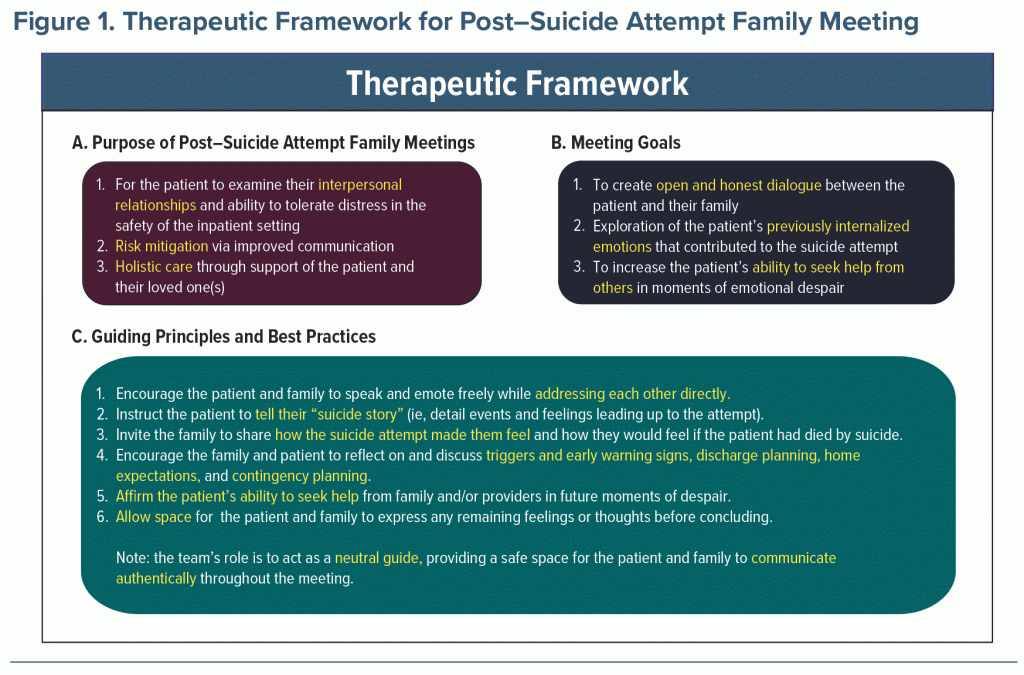Family involvement following a patient’s suicide attempt is important for suicide prevention and safety planning.1 However, there is no widely accepted approach to the post–suicide attempt family meeting. In this report, we propose a novel framework for this family meeting within the context of a patient case.
Case Report
Ms A is a 65-year-old woman with a past psychiatric history of bipolar I disorder
and posttraumatic stress disorder with 3 prior suicide attempts. She presented to the emergency department (ED) in August 2022 with altered mental status following intentional overdose of acetaminophen and alcohol. She was found at home by her husband and received medical management in the ED and on the medical floor. She reported that her suicide attempt occurred amid feelings of despair after lithium discontinuation approximately 10 weeks prior to presentation. Per outside documentation, the patient’s outpatient psychiatrist had elected to taper off her lithium for reasons that are not entirely clear. Attempts to reach Ms A’s outpatient psychiatrist by phone were unsuccessful, which disappointed her. Once medically stabilized, Ms A was transferred to an inpatient psychiatry unit and reinitiated on lithium, which was titrated to 300 mg twice/day with a therapeutic level of 1.06 mmol/L. Ms A reported an improvement in her suicidal ideation and increased hopefulness. On the 10th day of admission, the psychiatry team convened a post–suicide attempt family meeting with Ms A and her husband. Follow-up after discharge was planned with a psychiatrist whom she had not seen before at Ms A’s request. Per routine, follow-up was not planned with the inpatient psychiatry team. We discussed with the patient that were she to return to the hospital, we would be glad to care for her again. Additionally, Ms A had recently established care with a new primary care provider for annual routine medical examinations.
(De)Constructing the Family Meeting: A Systematic Approach
The systematic approach to the post–suicide attempt family meeting consists of 6 steps (Figure 1):
- Encourage the patient and family to speak and emote freely while addressing each other directly.
- Instruct the patient to tell their “suicide story” consisting of detailed events and feelings leading up to the attempt.
- Invite the family to share how the suicide attempt made them feel and how they would feel if the patient had died by suicide.
- Encourage the family and the patient to reflect on and discuss triggers and early warning signs, discharge planning, home expectations, and contingency planning.
- Affirm the patient’s ability to seek help from family and/or providers in future moments of despair.
- Allow space for the patient and family to express remaining feelings or thoughts before concluding.
Discussion
Suicide attempts are a significant cause of morbidity worldwide.2,3 Research is ongoing into best practices in suicide reattempt prevention.4–6 One meta-analysis suggests that active contact and follow-up demonstrate the clearest reduction in repeat suicide attempts at 12 months when compared to psychotherapy, pharmacology, and other methods.7 We argue that a well-planned, well-executed family meeting following a suicide attempt can prime a patient for engagement with follow-up, facilitating suicide prevention and safety planning.
Ms A’s case highlights the therapeutic benefit of a systematic approach to the post–suicide attempt family meeting. The psychiatry treatment team serves as a neutral guide, providing a safe space for authentic communication between the patient and family. A neutral and authentic setting allows patients to examine their interpersonal relationships and improve their distress tolerance before returning to possibly triggering home and community environments.8 Additionally, incorporating a patient’s loved ones in their care may bolster therapeutic alliance. Offering support to the patient and family enables the family to play an active role in patient safety and well-being.9 Furthermore, survivors of suicide have reported feelings of guilt, shame, and isolation around their attempts.10 Improved communication between patients and their families following a family meeting mitigates the risk of reattempts by fostering support, transparency, and destigmatization. Lastly, for patients with a primary care provider, this meeting can serve to reenforce which precautions and anticipatory guidance to relay to the patient’s primary care provider for further risk mitigation and continuity of care.
Following a suicide attempt, a family meeting facilitated by a psychiatry treatment team represents a unique opportunity for processing of a family trauma and prevention of suicide reattempt. The family meeting framework described here aims to promote mutual understanding between patients and their families, to improve help-seeking behavior, and to restore hope following a suicide attempt.
Article Information
Published Online: December 19, 2023. https://doi.org/10.4088/PCC.23cr03565
© 2023 Physicians Postgraduate Press, Inc.
Prim Care Companion CNS Disord 2023;25(6):23cr03565
Submitted: May 17, 2023; accepted August 22, 2023.
To Cite: Panzer KV, Kavoussi AM, Penzner JB. A therapeutic framework for post–suicide attempt family meetings. Prim Care Companion CNS Disord. 2023;25(6):23cr03565.
Author Affiliations: Department of Psychiatry and Neurobehavioral Sciences, University of Virginia School of Medicine, Charlottesville, Virginia (Panzer); Department of Psychiatry and Behavioral Sciences, Duke University School of Medicine, Durham, North Carolina (Kavoussi, Penzner).
Corresponding Author: Julie B. Penzner, MD, Duke Regional Hospital, Behavioral Health Building-Residency Program, 3643 N Roxboro St, Durham, NC 27704 ([email protected]).
Relevant Financial Relationships: None.
Funding/Support: None.
Previous presentations: Presented as a poster at American Psychiatric Association’s 2023 Annual Meeting; May 21, 2023; San Francisco, California.
Patient Consent: Consent was received from the patient to publish the case report, and information has been de-identified to protect anonymity.
ORCID: Kira Panzer: https://orcid.org/0000-0003-0861-6734
References (10)

- Stanley B, Brown GK. Safety planning intervention: a brief intervention to mitigate suicide risk. Cognit Behav Pract. 2012;19(2):256–264. CrossRef
- World Health Organization (WHO). National Suicide Prevention Strategies: Progress, Examples and Indicators. WHO; 2018.
- Turecki G, Brent DA, Gunnell D, et al. Suicide and suicide risk. Nat Rev Dis Primers. 2019;5(1):74. PubMed CrossRef
- Hill NTM, Shand F, Torok M, et al. Development of best practice guidelines for suicide-related crisis response and aftercare in the emergency department or other acute settings: a Delphi expert consensus study. BMC Psychiatry. 2019;19(1):6. PubMed CrossRef
- Oquendo MA, Porras-Segovia A. Barriers for the Research, Prevention, and Treatment of Suicidal Behavior. In: Baca-Garcia E, ed. Behavioral Neurobiology of Suicide and Self Harm. Current Topics in Behavioral Neurosciences. Vol 46. Springer Cham; 2020.
- Choi KH, Wang SM, Yeon B, et al. Risk and protective factors predicting multiple suicide attempts. Psychiatry Res. 2013;210(3):957–961.PubMed CrossRef
- Inagaki M, Kawashima Y, Kawanishi C, et al. Interventions to prevent repeat suicidal behavior in patients admitted to an emergency department for a suicide attempt: a meta-analysis. J Affect Disord. 2015;175:66–78. PubMed CrossRef
- Ruch DA, Heck KM, Sheftall AH, et al. Characteristics and precipitating circumstances of suicide among children aged 5 to 11 years in the United States, 2013–2017. JAMA Netw Open. 2021;4(7):e2115683. PubMed CrossRef
- Pereira AS, Willhelm AR, Koller SH, et al. Risk and protective factors for suicide attempt in emerging adulthood. Cien Saude Colet. 2018;23(11):3767–3777.
- Krychiw JK, Ward-Ciesielski EF. Factors related to suicide’s unpredictability: a qualitative study of adults with lived experience of suicide attempts. Int J Qual Stud Health Well-being. 2019;14(1):1650585. PubMed CrossRef
Enjoy this premium PDF as part of your membership benefits!






